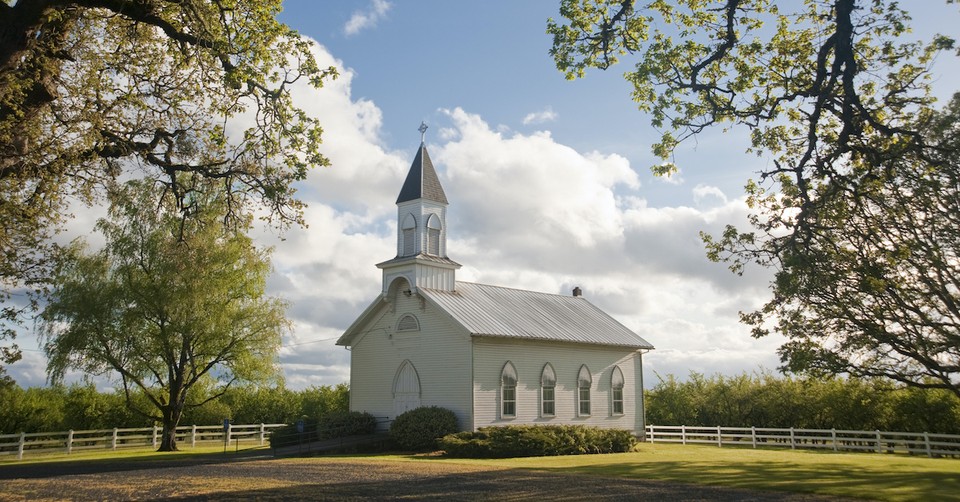3 Reasons Why Jesus Went to Church

Have you ever considered what it must have been like for Jesus to sit through a service at the temple? After all, as elaborate as the human-built temple may have been, it was but a pale comparison of the heavenly Jerusalem. The gilded curtains and walls would never reflect the holiness of heaven; the most gloriously sounding choir would never compare with angelic voices.
Yet in the incarnation, God steps away from heavenly grandeur. Christ walks amid the very fragility of human life and of human worship. Can you imagine what it was like for the very enfleshment of God to sit amongst the crowds in the temple? What was it like for Jesus to listen to a sermon? Was Jesus ever frustrated with the flawed scriptural interpretation of the Rabbi? Did Jesus listen to a sermon and think, That’s not what that passage means? Or what about the music? Have you ever considered that the one who experienced an eternity of angelic choruses ringing now sits and listens to the dissonant chanting of an off-key cleric? How did Jesus receive these experiences?
Of course, capping all this off would be Christ’s experience of the temple community. How human fellowship must differ from the perfect harmony of heaven! In human fellowship, there is evidence of hostility, rancor, even discord. Instead of a heavenly temple filled with unceasing praise and worship, the human-temple sometimes loses its focus. Did Jesus ever experience the ill-motivated gossip or back-biting of fellow worshipers? Were there whispers from the gallery: I heard that Joseph isn’t the father…. The gospels record at least one event where Jesus is outraged at the lack of prayerful authenticity within the temple itself.
When we take all these experiences into consideration, have you ever asked yourself why Jesus continued to attend temple worship? Given the faulty preaching, the dull singing, and the constant struggle for authentic community, why would Jesus even bother? After all, if there was ever a person in history who could justify not going to church, it would be Jesus. So why was going to church so important for him?
Here are three reasons why Jesus went to church:
1. Entering the Father’s House
Scripture records only one event in Jesus’ childhood. Having traveled to Jerusalem to observe the Feast of the Passover, Jesus (unbeknownst to his family) stays behind in Jerusalem. When his family eventually realizes that he is not with them, they return to Jerusalem and find him in the temple courts. Remarkably, Jesus questions why Mary and Joseph anxiously searched for him. “Why were you searching for me . . .did you not know I had to be in my father’s house?” (Luke 2:49)
Jewish people recognized that God’s presence was everywhere. Many of the psalms articulate that one cannot flee from the presence of the Lord. “If I ascend to heaven you are there, if I make my bed in depths you are there.” (Psalm 139:8). Despite this, the temple held a special place in Jewish spirituality. The temple was understood to be the house of the Lord. This meant that the Spirit of God was specially located within the temple, specifically in the Holy of Holies. Sacrifices at the temple meant that the high priest sacrificed the worshiper’s offering in the very presence of the holy God. Thus, the temple was a physical place wherein one could be certain of divine meeting. Through engagement in the rites and liturgies of the temple, worshipers were assured of God’s presence and love for them. Pilgrimages to the temple were understood as a journey to the presence of God.
Obviously, Jesus knew that no human structure could ever contain the fullness of God’s presence. Yet by referring to the temple as “my Father’s house” (both here and in Luke 19:46) Jesus affirms the fundamental connection between temple worship and the manifest presence of God. Jesus spent time in the temple in order to draw closer to his heavenly Father in prayer and worship. Yes, Jesus observed personal prayer, yet God the Father could be uniquely encountered at the temple. Thus, Jesus’ desire to be at the temple was not merely to go through religious motions or tackle the religious questions of the day. Jesus recognized the temple as his Father’s house. And one does not journey to his Father’s house except to draw close to the Father.
2. Joining Corporate Worship
If there was anyone who could say that he could manage his spiritual life alone, it was Jesus. As a fully divine person, Jesus did not need the assistance of others to navigate the way of faith. Jesus could live faithfully through his own effort and ability. Yet Scripture records that Jesus constantly sought out the company of others. Jesus surrounded himself with people. One of the things that Scripture shows is that the fullness of prayer and worship often occurs in the company of the faithful.
God established a holy people. It would have been inconceivable for any Jewish person to believe that one could live faithfully yet remain separate from the wider community. To be a faithful person necessarily meant being part of the faithful people. Israel understood itself as the chosen people of God, not just a random collection of special individuals. For this reason, Jesus participates in corporate worship. In the incarnation, Jesus enters the very life of Israel. He joins the people of God in prayer and worship, in the very same fashion as Jesus joins Israel in repentance through John’s baptism, and in the celebration of the Passover.
The presence and witness of the faith community are of such importance that Jesus sets aside his own personal mastery of all things spiritual, to be a part of the very community he came to save. Christ’s participation in corporate worship is yet another expression of the incarnation.
3. Witnessing to the Kingdom of God
More than just a place to herald the presence of God, temple worship was also a foretaste of that which awaited the faithful. The celebratory feasts prefigured the heavenly banquet awaiting the people of God; the gathered congregation imaged the heavenly community. Gathering in worship, therefore, meant participating in the reality of God’s kingdom on earth as it is in heaven. Even the spiritual and moral purity of the temple, while never fully realized, was to echo the reality that the kingdom of God is one in which evil and sin are put to death. Temple worship pointed to the messianic age and allowed the faithful to, in some way, participate in it.
Jesus entered temple worship as a sign of the in-breaking of the Kingdom. Such an in-breaking, however, was not contrary to God’s salvific work among God’s people through history. Jesus came not to abolish, but to fulfill. Through his involvement in temple worship, Jesus declared that “the year of the Lord’s favor” had come upon the people and the time predicted by Isaiah was being now being fulfilled (Luke 4:16-21). Although the fullness of the kingdom is ultimately revealed in the incarnation itself, this does not detract from the fundamental role of the temple as that which pointed to the coming Kingdom of God. Immediately following the resurrection, the disciples continued to see the temple as the appropriate place to celebrate the fulfillment of God’s Kingdom, now experienced in the death and resurrection of Jesus.
What Does This Mean for Christians?
It can be easy to dismiss the need to participate in church. Given the multiplicity of demands and tasks, attendance at church can easily be deemed unnecessary. Also, many today have various critiques of the church community: namely, the community is imperfect, the music is off-key, or the liturgy seems dull. Perhaps the most popular critique is that the church just does not feed me. More and more people today are opting to live a “churchless” Christianity, devoid of any involvement in the church community.
This is where Christ’s own commitment to temple worship is instructive. After all, it is safe to say that the worship of the temple did not necessarily feed Jesus any spiritual food he was lacking. Yet he remained part of the community. Jesus never replaced temple worship with anything else. He routinely journeyed in and out of these communities. In fact, the sanctuaries of the temples and synagogues were often the very locations of his ministry. Teaching, healing, prayer, and spiritual conversations all occurred within the walls of these sacred spaces. Despite the imperfections inherent in any human institution, Jesus saw his participation in the gathered worship of the faithful to be incredibly important for his life and ministry.
If we wish to live our lives in the manner that Christ lived his, then participating in the worship of the church is not something we can easily dismiss. We ought to take up Christ’s lead and see the church as a necessary part of the very life and ministry that Christ calls us to. After all, if Jesus went to church faithfully, then it is an activity we would do well to emulate.
Photo credit: ©GettyImages/RobertCrum

Originally published January 18, 2021.




